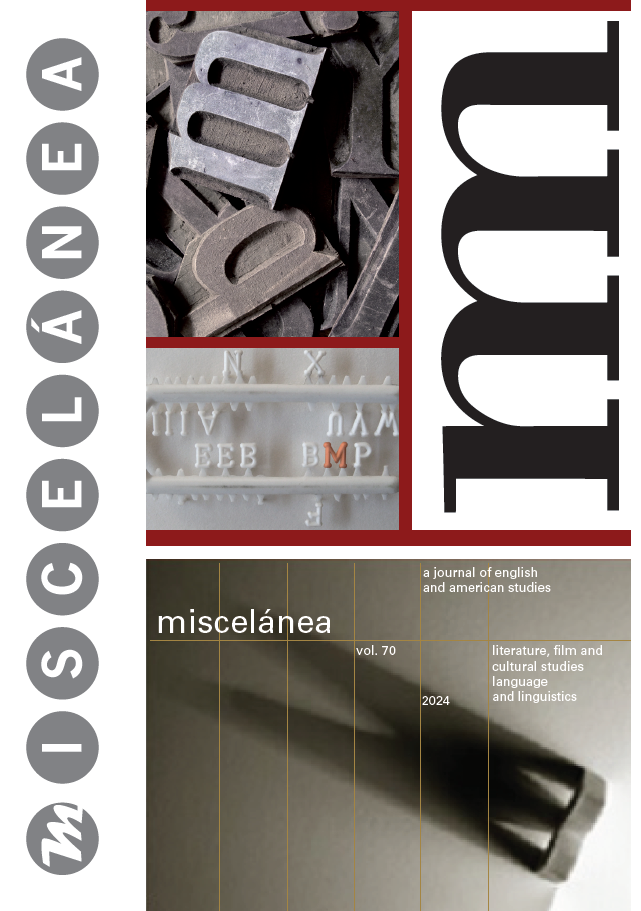A Corpus Study of Brexit Political Discourse: Exploring Modality through Lexical Modals
DOI:
https://doi.org/10.26754/ojs_misc/mj.20249837Keywords:
modality, lexical modals, corpus-assisted discourse studies, political discourse, BrexitAbstract
This paper aims to analyse the lexical modals used in the political speeches given by Boris Johnson and Jeremy Corbyn during the final months of the Brexit process. This study explores whether lexical choice shows the politicians’ commitment to their constituents, particularly to determine which lexical modals each politician uses and which semantic implication(s) these modals convey. The study is descriptive-interpretative and uses the corpus-assisted discourse studies approach. It contributes to research on modality in the English language by examining parts of speech other than (semi)auxiliary modal verbs. As the corpus analysis shows, lexical modals are a prominent resource employed by politicians to present facts to their audience.
Display downloads
References
ANANKO, Tatiana. 2017. “The Category of Evaluation in Political Discourse”. Advanced Education 4 (8): 128-137. DOI: https://doi.org/10.20535/2410-8286.108550
ARCANO, Clyde. 2020. “Corpus-Assisted Discourse Studies”. In Georgakopoulou, Alexandra and Anna De Fina (eds.) The Cambridge Handbook of Discourse Studies. Cambridge: Cambridge U.P.: 165-185. <https://doi.org/10.1017/9781108348195.009>. DOI: https://doi.org/10.1017/9781108348195.009
BAKER, Paul. 2006. Using Corpora in Discourse Analysis. London and New York: Continuum. DOI: https://doi.org/10.5040/9781350933996
BAKER, Paul. 2020. “Corpus-Assisted Discourse Analysis”. In Hart, Christopher (ed.) Researching Discourse: A Student Guide. London: Routledge: 124-142. <https://doi.org/10.4324/9780367815042-8>. DOI: https://doi.org/10.4324/9780367815042-8
BNC Consortium. 2007. The British National Corpus, XML Edition. Oxford Text Archive. <http://handle.net/20.500.12024/2554>. Accessed October 30, 2022.
BREZINA, Vaclav. 2018. Statistics in Corpus Linguistics: A Practical Guide. Cambridge: Cambridge U.P. <https://doi.org/10.1017/9781316410899>. DOI: https://doi.org/10.1017/9781316410899
BYBEE, Joan and Suzanne FLEISCHMAN. 1995. “Modality in Grammar and Discourse: An Introductory Essay”. Modality in Grammar and Discourse 14: 503-517. DOI: https://doi.org/10.1075/tsl.32.22byb
CHENG, Maria. 2016. “The Power of Persuasion: Modality and Issue Framing in the 2012 Taiwan Presidential Debates”. Discourse and Society 27 (2):172-194. DOI: https://doi.org/10.1177/0957926515611556
DEPRAETERE, Ilse and Susan REED. 2020. “Mood and Modality in English”. In Aarts, Bas and April McMahon (eds.) The Handbook of English Linguistics. Oxford: Blackwell Publishing Ltd: 207-227. DOI: https://doi.org/10.1002/9781119540618.ch12
DUNMIRE, Patricia L. 2012. “Political Discourse Analysis: Exploring the Language of Politics and the Politics of Language”. Language and Linguistics Compass 6 (11): 735-751. DOI: https://doi.org/10.1002/lnc3.365
EDELMAN, Murray. 1985. “Political Language and Political Reality”. PS: Political Science and Politics 18 (1): 10-19. DOI: https://doi.org/10.2307/418800
EKAWATI, Rosyida. 2019. “Power through Linguistic Modalities in Indonesian Presidential Speeches”. Discourse and Interaction 12 (1): 5-28. <https://doi.org/10.5817/DI2019-1-5>. DOI: https://doi.org/10.5817/DI2019-1-5
FAIRCLOUGH, Norman. 1989. Language and Power. London: Routledge.
FRADEJAS RUEDA, José Manuel. 2019. Cuentapalabras. Estilometría y análisis de textos con R para filólogos. <http://www.aic.uva.es/cuentapalabras>. Accessed May 25, 2022.
GISBORNE, Nikolas. 2007. “Dynamic Modality”. SKASE Journal of Theoretical Linguistics 4 (2): 44-61.
HARDIE, Andrew. 2012. “CQPweb – Combining Power, Flexibility and Usability in a Corpus Analysis Tool”. International Journal of Corpus Linguistics 17 (3): 380-409. DOI: https://doi.org/10.1075/ijcl.17.3.04har
HUDDLESTON, Rodney. 1988a. English Grammar: An Outline. Cambridge: Cambridge U.P.
HUDDLESTON, Rodney. 1988b. Introduction to the Grammar of English. Cambridge: Cambridge U.P.
HUDDLESTON, Rodney and Geoffrey K. PULLUM. 2002. The Cambridge Grammar of the English Language. Cambridge: Cambridge U.P. DOI: https://doi.org/10.1017/9781316423530
HUDDLESTON, Rodney, Geoffrey K. PULLUM and Brett REYNOLDS. 2021. A Student’s Introduction to English Grammar. Cambridge: Cambridge U.P. DOI: https://doi.org/10.1017/9781009085748
KILGARRIFF, Adam, Vít BAISA, Jan BUŠTA, Miloš JAKUBÍČEK, Vojtěch KOVÁŘ, Jan MICHELFEIT, Pavel RYCHLÝ and Vít SUCHOMEL. 2014. “The Sketch Engine: Ten Years on”. Lexicography 1 (1): 7-36. <https://doi.org/10.1007/s40607-014-0009-9>. DOI: https://doi.org/10.1007/s40607-014-0009-9
KHOMUTOVA, Tamara N. 2014. “Mood and Modality in Modern English”. Procedia: Social and Behavioral Sciences 154: 395-401. DOI: https://doi.org/10.1016/j.sbspro.2014.10.174
MARTIN, James andPeter WHITE. 2007. The Language of Evaluation: Appraisal in English. London: Palgrave Macmillan.
MORLEY, John. 2011. “Introduction. A Description of CorDis”. In Morley, John (ed.) Corpus-Assisted Discourse Studies on the Iraq Conflict: Wording the War. London: Routledge: 1-11. DOI: https://doi.org/10.4324/9780203868157
NUYTS, Jan. 2016. “Surveying Modality and Mood”. In Nuyts, Jan and Johan Van Der Auwera (eds.) The Oxford Handbook of Modality and Mood. Oxford: Oxford U.P.: 31-49. DOI: https://doi.org/10.1093/oxfordhb/9780199591435.013.37
ORREQUIA-BAREA, Aroa and Encarnación ALMAZÁN-RUIZ. 2021. “Modelling through Modality: (Re)shaping Brexit”. ES Review. Spanish Journal of English Studies 42: 127-153. <https://doi.org/10.24197/ersjes.42.2021.127-153>. DOI: https://doi.org/10.24197/ersjes.42.2021.127-153
PALMER, Frank Robert. (1988) 2001. Mood and Modality. Cambridge: Cambridge U.P. DOI: https://doi.org/10.1017/CBO9781139167178
PALTRIDGE, Brian. 2012. Discourse Analysis: An Introduction. London: Bloomsbury Publishing. DOI: https://doi.org/10.5040/9781350934290
PARTINGTON, Alan. 2004. “Corpora and Discourse, a Most Congruous Beast”. Corpora and Discourse 1: 11-20.
PARTINGTON, Alan, Alison DUGUID and Charlotte TAYLOR. 2013. Patterns and Meanings in Discourse: Theory and Practice in Corpus-Assisted Discourse Studies (CADS). Amsterdam / Philadelphia: John Benjamins Publishing. DOI: https://doi.org/10.1075/scl.55
QUIRK, Randolph, Sidney GREENBAUM, Geoffrey LEECH and Jan SVARTVIK. 1985. A Comprehensive Grammar of the English Language. London: Longman.
RAYSON, Paul. “Log-likelihood and Effect Size Calculator”. <https://ucrel.lancs.ac.uk/llwizard.html>. Accessed February 27, 2024.
ROZUMKO, Agata. 2019. Modal Adverbs in English and Polish. A Functional Perspective. Białystok: Wydawnictwo Uniwersytetu w Białymstoku.
SIMON-VANDENBERGEN, Anne-Marie. 1996. “Image-Building through Modality: The Case of Political Interviews”. Discourse and Society 7 (3): 389-415. DOI: https://doi.org/10.1177/0957926596007003005
SIMON-VANDENBERGEN, Anne-Marie. 1997. “Modal (Un)certainty in Political Discourse: A Functional Account”. Language Sciences 19 (4): 341-356.SOMAI, Miklós and Zsuzsanna BIEDERMANN. 2016. “Brexit: Reasons and Challenges”. Acta Oeconomica 66: 137-156. DOI: https://doi.org/10.1016/S0388-0001(96)00068-X
TAYLOR, Charlotte and Anna MARCHI. 2018. Corpus Approaches to Discourse. A Critical Review. London: Routledge. DOI: https://doi.org/10.4324/9781315179346
TORRECUADRADA GARCÍA-LOZANO, Soledad and Pedro GARCÍA FUENTE. 2017. “¿Qué es el Brexit? Origen y posibles consecuencias”. Anuario Mexicano de Derecho Internacional 17: 3-40. DOI: https://doi.org/10.22201/iij.24487872e.2017.17.11030
TRAUGOTT, Elizabeth Closs. 2011. “Modality from a Historical Perspective”. Language and Linguistics Compass 5 (6): 381-396. DOI: https://doi.org/10.1111/j.1749-818X.2011.00280.x
Published
Issue
Section
License
Copyright (c) 2024 Encarnación Almazán Ruiz, Aroa Orrequia-Barea

This work is licensed under a Creative Commons Attribution-NonCommercial 4.0 International License.
How to Cite
Accepted 2024-05-14
Published 2024-12-16


